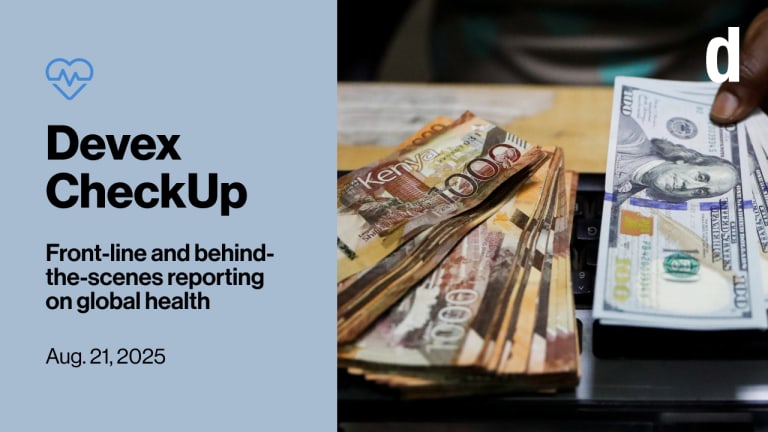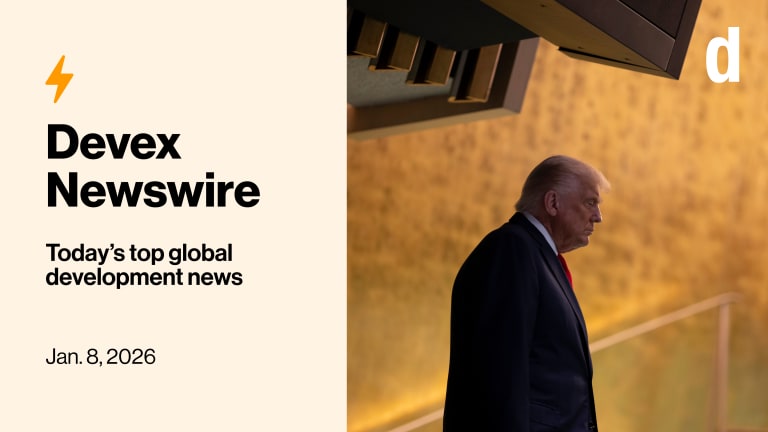
NEW YORK — As international relief and aid organizations develop responses to the threat of novel coronavirus in Africa, only a few international NGOs are directly engaging in the epicenter of the public health crisis in Wuhan, China.
“It is unusual — China is not a place we traditionally work in.”
— Thomas Tighe, CEO, Direct ReliefThe Chinese government has eased visa restrictions on aid organizations since the outbreak of the virus at the end of December, but it remains complicated for new groups to join prevention and treatment efforts, according to Chris Skopec, executive vice president of global health at the humanitarian relief organization Project HOPE. All are expected to work through existing health systems and agencies in China, he said.
“We have had more flexibility on the ground since this response began than we have had in a long time, and I think that speaks to a recognition of what a crisis this is, and how it is all-hands-on-deck at the moment,” Skopec said in a recent interview with Devex. “We have found a welcoming operating environment, in this regard, but it is difficult if you are an international NGO or response organization to book your ticket to Wuhan and hit the environment running. It is just not that type of context.”
As of Friday, the World Health Organization had confirmed 48,010 cases of COVID-19 in China, with 1,383 reported deaths. Outside of China, there are 505 cases from 25 countries and two confirmed deaths. But the numbers continue to rise each day in the fast-moving outbreak. Dr. Tedros Adhanom Ghebreyesus, director-general of WHO, warned in a press conference Wednesday that the “outbreak could still go in any direction.”
Protective equipment for health workers is also a top priority for Project HOPE, which has operated in China since 1983. In the last two weeks, the relief organization has delivered over 2 million face masks, 11,000 protective suits, and 280,000 pairs of exam gloves to public hospitals in Wuhan, in addition to more than 365,000 face masks and other protective gear to the Shanghai Children’s Medical Center and the Hubei Provincial Charity Federation.
“The requests coming to us are more than we can keep up with, and clearly the need outweighs the supply available by a large margin right now,” Skopec said.
“What you are seeing is health workers that are trying to make do with what is available, and that can mean working long shifts without so much as taking a bathroom break or a water break, or reusing protective suits for five or six shifts in a row and taking their own measures to disinfect them and sterilize them,” Skopec continued.
And the California-based emergency health organization Direct Relief has delivered 572,000 N95 respirator masks, more than 340,00 gloves, and other items such as shoe covers from its emergency medical stockpile, according to spokesperson Paul Sherer. Direct Relief last worked in China following the Sichuan earthquake in 2008 and was approached early this year by alumni associations of Wuhan universities.
“It is unusual — China is not a place we traditionally work in,” said Thomas Tighe, CEO of Direct Relief. “China has never really been a place that has requested assistance from Direct Relief, but if there is a need, that is nice for us — helping doctors in hospitals who are quite short on supplies and are quite anxious, as we would do anywhere.”
Direct Relief is working with FedEx to send continued shipments of protective gear. Many of the products themselves were manufactured in China, Tighe noted.
“I don’t think anyone with an inventory of protective gear anticipated this unusual event. We have been able to fill the orders we receive. Everyone wants masks — regular consumers — so our priority is to focus on the health workforce, like always,” Tighe said.
WHO and the U.S. Agency for International Development are also trying to fill the gap in protective gear, with global demand up to 100 times higher than normal and prices up to 20 times higher, according to WHO.
“At the moment, I cannot imagine having an MSF or International Medical Corps go into China and start providing medical care.”
— Ashley Arabasadi, health security policy adviser, Management Sciences for HealthUSAID, which delivered a protective gear donation to Laos this week, is currently examining further donations to other affected and at-risk countries, according to a USAID spokesperson.
“USAID's stockpile, jointly managed by WHO, is a limited, emergency stockpile for short-term requests and is not meant to cover the entirety of needs for an outbreak, but rather provide a stopgap for front-line health care workers in hospitals and health facilities,” the spokesperson said.
Save the Children China has also delivered 36,000 face masks from a storage facility in Indonesia to hospitals in Wuhan, with support from local volunteers.
Meanwhile, organizations such as the U.N. Office for the Coordination of Humanitarian Affairs stand by, ready to assist China directly.
“Obviously, the goal at the moment is to contain the spread of the virus. And I'm helping to the extent I can with all the work that the WHO is doing,” U.N. Emergency Relief Coordinator Mark Lowcock told Devex. “And we'll have to see how things play out. It could, as Tedros has been warning, go in a variety of different directions, and we need to be ready for that. And the U.N. is trying to do its bit to get ready, but also importantly to help countries get ready.”
Médecins Sans Frontières has also offered to support health authorities in mainland China and Hong Kong. “MSF teams around the world stand ready to support health authorities to deal with the epidemic,” it said in a recent media statement.
China’s strong economy and relatively stable health systems would likely prevent groups like MSF from delivering direct health care within the country, according to Ashley Arabasadi, health security policy adviser at Management Sciences for Health.
“At the moment, I cannot imagine having an MSF or International Medical Corps go into China and start providing medical care. I do not think that is going to happen because of how the health care system is functioning,” Arabasadi said.
“The real danger is when cases start emerging in countries with a limited or more fragile health system, like in the global south,” Arabasadi added.








